Workshops
There are no available registration dates at this time.
South Korea has it all—the modern and tech savvy cities, historic buildings, palaces and cultural traditions, varying and beautiful landscapes, and a variety of culinary delicacies that are an important part of their national identity and a foodie’s paradise!
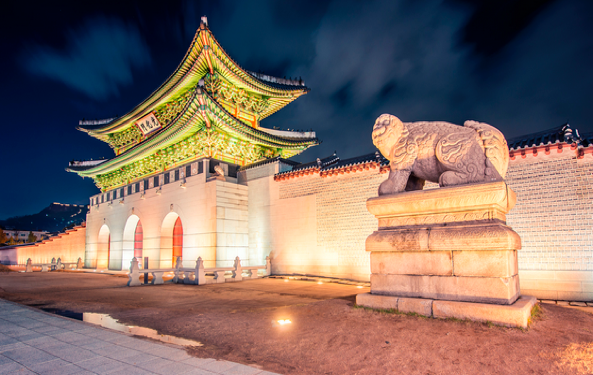
Our workshop begins in the ultra modern and cool city of Seoul that we’ll experience like a local. We’ll explore the ornate and ancient palaces of Gyeongbokgung, the Palace of Shining Happiness and Deoksugung, the Palace of Virtuous Longevity, filled with beautiful gardens, courtyards and pavilions, set against the backdrop of majestic mountains. At night, we’re street photographers capturing the sights in the Namdaemun market, a 600 year old labyrinthine of small shops and the largest traditional market in Korea, and creating portraits of Seoul’s high energy youth in the urban arts Hongik district of bars, cafes and clubs.
A day trip takes us to the border with North Korea, where news headlines are still being made in the notorious DMZ or JSA Joint Security Area. We’ll be photographing in the historic conference room—half in the South and half in the North, and where Kim Jong-un crossed into South Korea. We’ll descend into the once secret North Korean tunnels, visit the South Korean Dora Observatory, and photograph the notorious former Japanese Seodaemun Prison complex, now a museum commemorating the Korean freedom fighters that were imprisoned and killed there.
We then traverse the country, driving to the charming town of Jeonju, South Korea’s food capital and historic Hanok Village where you are sure to find women dressed in the Hanbok. In Gwangju you’ll attend a cooking class, learning to prepare kimchi and other Korean delights. During our travels in the surrounding countryside, you will have the opportunity to photograph traditional village life and architecture, local markets of regional goods, tea plantations, and breathtaking mountainous landscapes.
In cosmopolitan Busan, we’ll start our day at the frenetic and famous Jahalchi fish market with its endless stalls of seafood and then go on to shoot the stunning panoramic views of the sea and the city skyline at the Haedong Yonggungsa Temple. At dusk, you’ll photograph amazing sunset images as we walk along the Oryukdo Skywalk, a glass bridge that juts out into the Sea of Japan.
Our final destination is the magnificent volcanic island of Jeju and a World Heritage Site, where we’ll explore caves, lava tunnels, cliffs, and trek to the Sangumburi Crater and Seongsan Sunrise Peak to capture dramatic scenes of the volcanic landscapes—a photographer’s dream!
Tuition Note: At the time of registration a $1500 deposit will be taken. At that point you will be transferred to Arlene Collins and all further correspondence and financial matters will be handled directly with her.
Itinerary
14 days: Jan. 26 – Feb. 9, 2020
Pre-group travel
From the United States it take one full day to arrive in Seoul. You must depart the United States by Sunday Jan. 26 in order to arrive in Seoul by Monday Jan. 27th. As of May 1, 2019 Korea Air has two nonstop flights from JFK to Seoul, one flight arrives in Seoul at 05:15 am and the other flight arrives at 16:25.
On Feb. 9th flights depart Seoul at 10:00 or at 19:30.

Day 1: Arrive in Seoul Lotte Hotel
Mon. Jan. 27 After arriving at the Incheon International Airport (ICN) take the high-speed train to the city and taxi to our hotel located in the city center. Check in to the Lotte Executive Tower at the Sky Lobby Reception. During your stay you have use of the Le Salon Executive Lounge located on the 16 Floor, Hours 6:30 – 22:00
Day 2: Seoul Lotte Hotel
Tue. Jan. 28 This morning we take the Metro to Gyeongbokgung Palace, built in 1483 during the reign of King Sejong and destroyed by the Japanese in the early 1900s. The palace was completely rebuilt after Korean independence in the1950s. The ornate Myeongjeongjeon hall is where the King received official guests. Our next location is Deoksugung Palace (Deoksu) – Palace of Virtuous Longevity – to photograph the changing of the guard. The Palace was built in 1395 under the Joseon Dynasty and is the former home of Korea’s royal family. The Palace Complex features two main palaces, one built in traditional Korean style with many late Joseon structures, courtyards, gardens and the ornate Daehanmun Gate.
Join the locals at Tongin market for Tteokbokki a traditional Korean rice cake lunch or compose your own lunch box with local ingredients. We then explore the charming Insa-dong district with its traditional architecture. End our day at Café Darak located on the top floor of the City Hall, for an aerial view of the city. (B & D)
Tonight welcome cocktails in Le Salon Lounge and dinner at a local restaurant.
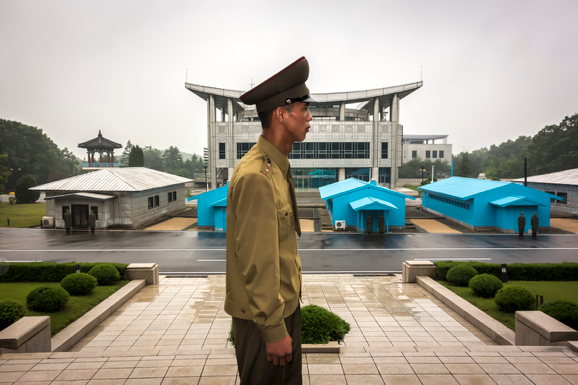
Day 3: Seoul (DMZ) Lotte Hotel
Wed. Jan. 29 today we drive 1 hour and 20 minutes to Paju and to Imjingak Park for the official shuttle bus to the DMZ aka the Joint Security Area (JSA). The Korean Demilitarized Zone is a 250 km buffer zone along 38th parallel separating the North and South. The Zone was established in 1953 by the provisions of the Korean Armistice Agreement. Photograph North Korea from the south and step inside the conference room where half the room is in the south and the other half is in the north.
We then descend into the secret Third Infiltration Tunnel dug by the North Korean army in the 1970s, visit the Dora Observatory for a panoramic view of the North Korean hills, including the “peace village” Kijong-dong, aka the “propaganda village” by South Koreans, and the Dorasan Station, once used to transfer materials to the Kaesong ndustrial Complex. After lunch we return to Seoul.
This afternoon we photograph the Seodaemun Prison Hall built in 1910 was used by the Japanese to imprison, torture and execute Korean freedom fighters. Now is amuseum contains main men’s prison with 3 different cells rows, a tiny women’s prison, execution chamber, a factory, hospital, kitchens, sports facilities and an exhibition hall. Late afternoon gallery visits to Baudoin Lebon and Lehmann Maupin. (B)
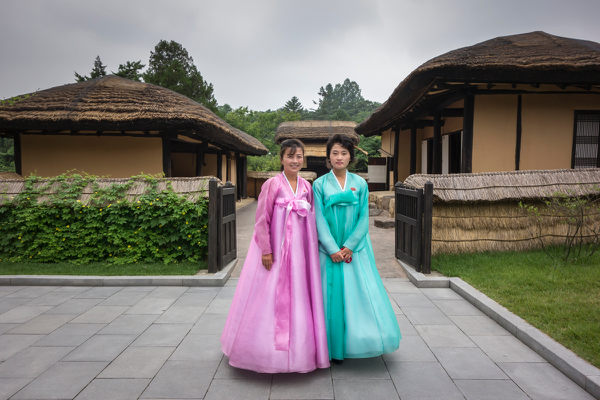
Day 4: Seoul – Goseong – Sokcho Lotte Resort
Thu. Jan. 30 4 hour drive from Seoul to Goseong, visit the Goseong Unification observatory, and visit Castle at Hwajinpo (Vila of Kim Il Sung) – former leader of North Korea, for its fortress like exterior. The villa was used as a summerhouse not only by the Kim family, but also by high-level members of the communist party from 1948 to 1950. Lunch in Goseong
This afternoon we photograph at Mt. Seorak (Seoraksan) National Park designated a UNESCO Biosphere Preservation District. The park with its towering granite peaks and dramatic valleys is divided into areas and has several imposing peaks, waterfalls, unusual rock formations, and temples, We take a cable car to the Gwongeumsanseong fortress to photograph some of the best views of the forested coastline. (B)
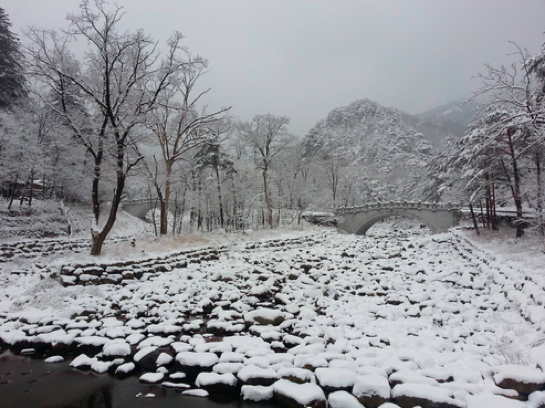
Day 5: Sokcho – Pyeongchang- Jeonju Ramada Jeonju Resort
Fri. Jan. 31 This morning we drive 1hour from Sokcho to Pyeongchag, to visit the ancient Woljeongsa Temple. The temple founded in 643 A.D features a nine story stone pagoda, a stone seated Medicine Buddha and the partial remains of an ancient Buddha. Continue on to Jeonju Buyeo where we will stop to photograph the ancient Royal Tombs (Neungsan-ri). We then visit Geumsan, home to the world’s best Ginseng and where we will see the processing of this magical medicinal herb. (B)
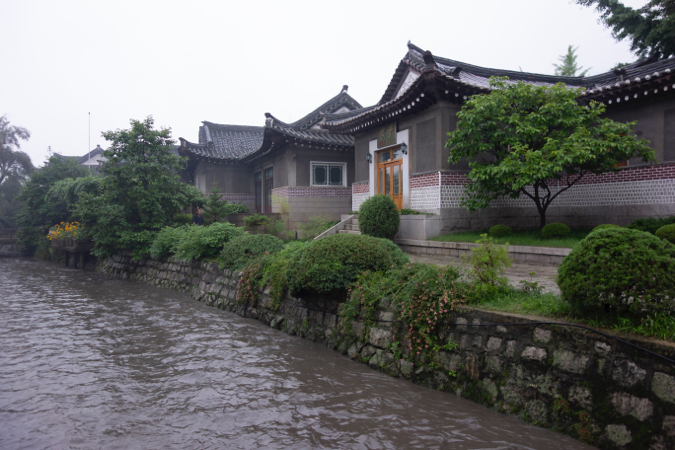
Day 6: Jeonju Hotel Ramada
Sat. Feb. 1 Jeonju is South Korea’s food capital, and home to the historic Hanok Village with its traditional architecture of low houses constructed of wood, clay and curved roofs. The village has a shrine, cathedral and Confucian school. Explore the back streets where you are sure to find women wearing the traditional “Hanbok’ costume.
This evening we visit the Nambu Traditional market, established in 1905 with over 800 stores selling various goods & foods. Jeonju is famous for its Bibimbap, a dish of rice cooked in beef broth covered with different toppings, Kngnamul Gukbap a bean sprout soup with rice, and taste Makgeolli, ‘Moju’ this regional drink is low alcohol drink made wiith ginger, ginseng and cinnamon. (B)
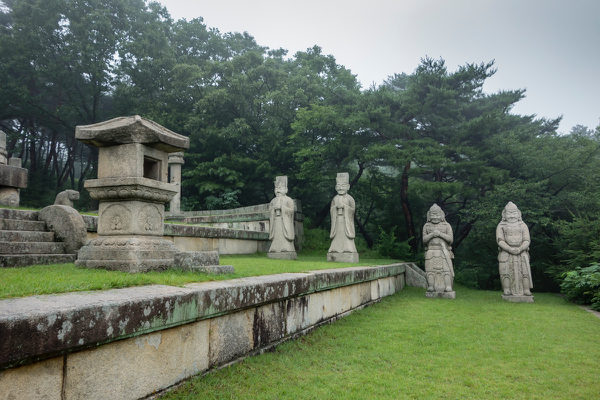
Day 7: Jeonju – Sunchang- Damyang-Gwangju Ramada Hotel
Sun. Feb. 2 This morning we attend a cooking class where you will learn to make traditional Korean cuisine. After class we drive to Sunchang Gochujand village to photograph traditional making of chili paste. Time permitting we stop to photograph in Juknokwon bamboo Tree Park. (B& L)
Day 8: Gwangju – Boseong –Suncheon –Gwangyang Rakhy Hotel
Mon. Feb. 3 After breakfast we drive we to Boseong famous for its green tea to photograph a Tea Plantation, we continue to Suncheon to see the Nakaneupseong Fortress. (B)
Day 9 Gwangyang – Namhae – Busan Paradise Hotel
Tue. Feb. 4 A 3 hour drive takes us the unusual hill top village of Namhae Darangi Village perched over the sea and surrounded by rice paddies. Here we hike up through terraced fields of rice to photograph this seaside village.
Busan South Korea’s second largest city where we will visit the UN Memorial Cemetery, the only cemetery in the world officially recognized by the United Nations as the final resting place for more than 2,000 soldiers from 11 countries who fought in the Korean War. (B)
Day 10: Busan Paradise Hotel
Wed. Feb. 5 Early this morning visit the renowned frenetic Jahalchi fish Market and the Taejongdae, the Songdo skywalk and Gamcheong village. (B)
Day 11: Busan – Jeju Shilla Hotel
Thu. Feb. 6 This morning we take a short flight to Jeju Island, off the south coast. The island features volcanic rock formations, lava tunnels, the Jungmun columns, and the famous statues dol hareubang aka ‘stone grandfather’. These phallic-shaped porous stone statues have a prominent nose, bulging eyes and a smile and are unique to the island. (B)
Day 12: Jeju Shilla Hotel
Fri. Feb. 7 Full day exploring the Island Manjang cave, Seongsan Ilchulbong Peak (Sunrise Peak), Seongeup Folk Village. Jusangjeolo hexagon lava cliff and the Sangumburi Crater (B)
Day 13: Jeju – Seoul / Incheon Gyeongwonjae Hanok Hotel
Sat. Feb. 8 This morning we return to Seoul and to the Songdo “The City of the Future” district. (B)
Day 14: Depart Seoul for home
Sun. Feb. 9 Group Airport transfers
Workshop Fee
The workshop fee is $9,995.00 for 6 – 10 participants and $10,990.00 for 4 to 5 participants and includes shared accommodations, group hotel transfers, all regional transportation, private touring, full time private English speaking guides, some meals, all gratuities for our guides and drivers, and on site photography instruction. A deposit of $1,500.00 must accompany your Registration Form and the Liability Waiver. The final payment is due by Oct. 1, 2019.
Not included is international flights, single supplement accommodations, travel and medical evacuation insurance, visa fees, personal expenses and items, personal photography fees, and meals and beverages not indicated on the itinerary, and any optional activities. The single supplement charge is $2,500.00.
Who Should Attend:
These workshops are for the serious amateur who has a working knowledge of their camera and for the professional photographer or videographer, and who wants to combine advancing their photography skills with an adventurous travel experience. Participants should be highly motivated, technically self-sufficient, and capable of navigating in foreign cultures and physically fit. Participants may work with still photography or video and are encouraged to explore on their own. All workshops include on location instruction and offer unique opportunities to photograph diverse cultures, rich landscapes and remarkable architecture. Non-photographing companions are encouraged to attend. My groups are limited to 8 to 10 participants depending on the location. This allows for a more personal photography & travel experience. Space is limited in all workshops.
Visa: No visa is required for up to a 90 day stay for U. S. citizens
Plugs: 220- 240 voltage Type C/F same as in Europe
Currency: Koran Won
Internet: Is everywhere and fast
Maps: Use the Kakaomap app on your phone
TERMS & CONDITIONS
COLLINS PHOTOGRAPHY WORKSHOPS
1. Reservations & Payments
A deposit of $ 1,500.00 per person is required to confirm your reservation for the Korea Workshop. Final payment in full is due by Oct. 1, 2019. Arlene Collins Photography, LLC, reserves the right to cancel a reservation if full payment has not been received by the stated due date.
2. Cancellations
All cancellation notices must be received in writing and will become effective as of the date of the postmark. If you cancel 90 days or more prior to departure, a refund less an administration fee of $750.00 and less any payments made to travel agents, hotels and sub-contractors will be issued. No refunds are issued if you cancel within 90 days prior to departure. For payments not refunded consult your insurance carrier. Refunds cannot be made to participants who do not complete the workshop for any reason at all.
3. Basis of Rates
All prices are quoted in US dollars. Due to unforeseen circumstances including but not limited to the rising cost of airfares, ground transportation, fuel surcharges, accommodations and currency fluctuations prices are subject to change. Therefore, Arlene Collins Photography, LLC reserves the right to amend trip prices or levy a surcharge on the cost of the trip without prior notice.
4. Insurance
Trip Cancellation and Baggage insurance protection and Emergency Medical Evacuation, Accident and Sickness Insurance Protection are strongly recommended. Camera equipment, computers and baggage are carried entirely at the owner’s risk, and we accept no responsibility for lost, damaged or delayed property. Suggested travel insurance companies are CSA www.csatravelprotection.com and AIG www.travelguard.com, Allianz travel insurance www.allianztravelinsurance.com and for medical/air evacuation the air rescue card.
5. Itinerary Changes
The itinerary is subject to change without prior notification.
6. Passports and Visas
A valid passport is required for all travels. You are required to notify Arlene Collins Photography LLC, under which nationality your passport is registered. Collins Photography Workshops will notify you, if your destination requires a visa for U.S. citizens. Non-U.S. citizens are required to contact the appropriate consular office for entry requirements pertaining to their trip. Participants are responsible for obtaining their passports and visas. Your passport must have an expiration date of at least 6 months upon completion of this trip.
7. Medical Issues
All participants must be in good health. You must advise Arlene Collins Photography, LLC, prior to booking, of any health, physical, emotional or mental condition that may require special attention or adversely impact the other participants.
8. Single Travelers
Arlene Collins Photography LLC makes every effort to honor shared and single supplementary requests. However, shared accommodations cannot be guaranteed and the single supplement rate will apply, if we cannot provide accommodations.
9. Liability Waiver
Every participant is required to sign the liability waiver before the trip, acknowledging awareness and acceptance of the risks associated with the workshop and related travel.
10. Responsibility & Photography
To ensure a safe photographic experience you are required to obey local customs and be considerate when photographing people or sensitive locations. Arlene Collins has the right to eject any person from the workshop for disruptive behavior, compromising the group’s safety, enjoyment or violating the law.
